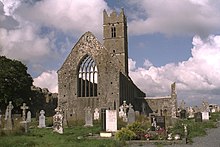Claregalway
| Baile Chláir Claregalway |
|
|---|---|
| Village | |
|
Location in Ireland |
|
| Coordinates: 53°20′19″N 8°56′44″WCoordinates: 53°20′19″N 8°56′44″W | |
| Country | Ireland |
| Province | Connacht |
| County | County Galway |
| Elevation | 12 m (39 ft) |
| Population (2011) | |
| • Urban | 1,217 |
| • Rural | 2,375 |
| Irish Grid Reference | M370324 |
| As this is a Gaeltacht village, the Irish Baile Chláir is the only official name. The anglicized name Claregalway has no official standing. | |
Baile Chláir or Baile Chláir na Gaillimhe (anglicized Claregalway) is a Gaeltacht[1] village about 10 km north of Galway in County Galway, Ireland. Claregalway was founded on the banks of the River Clare, hence the derivation of its name: Baile Chláir na Gaillimhe meaning “town on the Clare, in Galway”. Claregalway lies within the Gaeltacht and traditionally most of the locals would have only spoken English as a second language. An influx of new residents over the last 30 years has meant that most residents now rarely, if ever, speak Irish. Until 27 September 2017, the village sat at the junction of the busy N17 and N18 national primary routes with over 27,000 vehicles having formerly passed through the village every day.
Contents Irish language
There are 2,375 people living in the Baile Chlair ED and 12% are native Irish speakers.
History

East View of Claregalway Friary
This village has an ancient heritage stretching back over a thousand years. It has many features of historical interest but two of the largest ones on the banks of the river include the Claregalway Friary, founded in mid-13th century, and a Norman watchtower (small castle) completed in the 16th century. This watchtower is currently being refurbished for use as a residence. During 2001, a restoration of an old bridge over the old course of the River Clare was completed. These nine stone arches are above the level of the current road.[2]
Claregalway Parish is one of the largest in the county and includes a number of townlands (small clusters of houses) some of the bigger being Carnmore, Lydican, Loughgeorge and Cregboy. Lydican is notable as the origin of the Irish ancestors (Patrick Lynch) of Che Guevara. Lydican was actually an O’Heyne Castle and the last of the chieftains, Connor Crone O Heyne, was living there in 1612. The lands of the O’Heyne chieftains was confiscated in the late 17th century and it was then that the Lynches took up residence there. The Lynches principal holdings were in the city of Galway.
Economy
Agriculture would once have been the main industry. In recent years the population has been expanding very rapidly since the village is within the commuter belt of Galway City. Many city workers are choosing to live outside the city environs in a more rural setting. However, the larger population has also led to the growth of the service and retail sector and has provided additional local employment.
Culture
Claregalway hosts a Drama Festival each year in March. The Festival has a large number of followers both locally and in Galway City. Compántas Lir [1] is an amateur drama group which is based in Claregalway and Carnmore. Compántas tour nationally in the springtime as part of the All-Ireland Drama Circuit.
Sport
- Claregalway CLG is the local Gaelic Athletic Association club.
- Claregalway Basketball club participate in local leagues at underage through to senior level.
- Claregalway Handball club has also grown popular with members from 7 to 70+ years old. Due to the increasing popularity, planning for a new modern arena style handball alley was approved and is currently under construction at Lakeview, Claregalway. The completion date is listed as ‘late 2016’. It is proposed that the new handball alley will also be used for both squash and racquetball.
Annals of Connacht
1469: O Domnaill led a great army into Connacht to meet Macwilliam Burke. They both proceeded to Claregalway and burnt the town in spite of Thomond and Macwilliam, spent a night encamped there and were refused battle then. The next day they burnt the whole of Machaire Clainne Taidc, killing many horses and many men, including Domnall, son of O Conchobair of Corcomroe.
Notable residents
- Dana Rosemary Scallon, Irish singer and former MEP.
- Hector Ó hEochagáin Irish comedian, TV & Radio presenter
Facilities
- 2 hotels
- Primary School
- Secondary School
- 3 restaurants
- Community Centre
- GAA Club
- 10+ shops
References
External links
| Wikimedia Commons has media related to Claregalway. |

- Official website
- Claregalway Castle – Claregalway’s landmark castle
- Galway Garden Festival – Annual garden festival held in early July at Claregalway castle
- Claregalway.info—the community-curated website for Claregalway
- Nuacht Chláir—the community-curated newsletter for Claregalway
- Official Compántas Lir Website.
- Claregalway Basketball Club Website.[permanent dead link]
- Irish language study 2006




